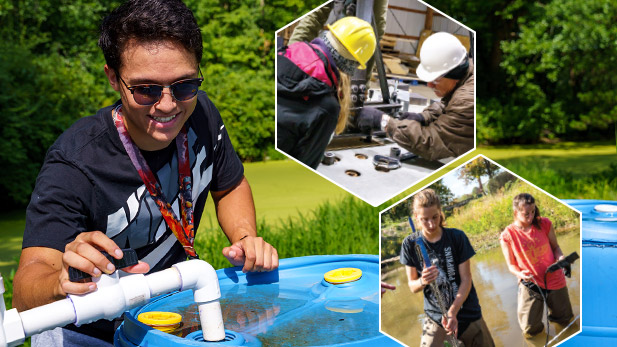Wabash Valley Projects Sought for Senior Year Civil Engineering Course
Wednesday, June 24, 2020

Teams of seniors annually spend each school year completing projects for a variety of communities, organizations and companies. Projects must feature at least two sub-disciplines within civil engineering.
Rose-Hulman seniors are seeking to culminate their educations by working in teams during the 2020-21 school year to complete civil engineering projects that could impact Wabash Valley communities, organizations, and companies.
The projects must feature at least two sub-disciplines within civil engineering, which includes structural, geotechnical, environmental, water resources, transportation, and general design.
Ideal projects would come from municipalities along with non-profit, charitable, or church organizations, according to Kevin Sutterer, head of the Department of Civil and Environmental Engineering. He stresses that projects should have a service component to provide students the ability to identify, investigate, and address a community need.
Past local senior-year capstone projects have helped plan portions of Terre Haute’s Heritage Trail system and Riverscape project and provided a foundation for the Wabashiki Fish and Wildlife Area wetlands. Organizations have used the students’ work as the basis for seeking local, state, and federal grants for their projects.
The senior-year capstone design course provides students an opportunity to work with external clients on a long-range project that covers the entire school year. Teams of three to five students begin investigating the client’s needs and propose a solution during September and October. Authorization is granted in November to proceed with detailed design. Most of the work is completed by mid-February, with final design work and final drawings completed in March. Faculty project reviews begin in early April and reports are presented to clients in late April or early May.
Although most Rose-Hulman faculty members are licensed professional engineers, Sutterer advises that the students’ work is being reviewed by professors acting as educators. Depending upon the project, the students’ designs might be detailed enough to begin construction, if approved by a professional engineer, or they might be at the level of a feasibility study.
Projects are completed at little to no cost for clients, but they are asked to sign a release or waiver of liability before the project is initiated.
Ideas for projects must be submitted in writing by July 31 to Sutterer at sutterer@rose-hulman.edu. People can contact him by email or 812-877-8959 with any questions or concerns.
The projects must feature at least two sub-disciplines within civil engineering, which includes structural, geotechnical, environmental, water resources, transportation, and general design.
Ideal projects would come from municipalities along with non-profit, charitable, or church organizations, according to Kevin Sutterer, head of the Department of Civil and Environmental Engineering. He stresses that projects should have a service component to provide students the ability to identify, investigate, and address a community need.
Past local senior-year capstone projects have helped plan portions of Terre Haute’s Heritage Trail system and Riverscape project and provided a foundation for the Wabashiki Fish and Wildlife Area wetlands. Organizations have used the students’ work as the basis for seeking local, state, and federal grants for their projects.
The senior-year capstone design course provides students an opportunity to work with external clients on a long-range project that covers the entire school year. Teams of three to five students begin investigating the client’s needs and propose a solution during September and October. Authorization is granted in November to proceed with detailed design. Most of the work is completed by mid-February, with final design work and final drawings completed in March. Faculty project reviews begin in early April and reports are presented to clients in late April or early May.
Although most Rose-Hulman faculty members are licensed professional engineers, Sutterer advises that the students’ work is being reviewed by professors acting as educators. Depending upon the project, the students’ designs might be detailed enough to begin construction, if approved by a professional engineer, or they might be at the level of a feasibility study.
Projects are completed at little to no cost for clients, but they are asked to sign a release or waiver of liability before the project is initiated.
Ideas for projects must be submitted in writing by July 31 to Sutterer at sutterer@rose-hulman.edu. People can contact him by email or 812-877-8959 with any questions or concerns.